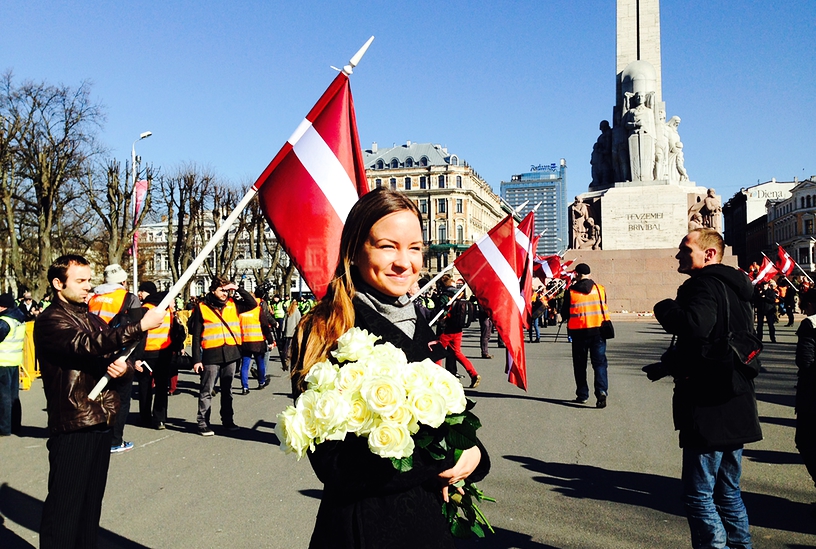With crowds melting away and crash barriers being dismantled, Interior Minister Rihards Kozlovskis told LSM: "Everything was calm. As always there were different points of view and some verbal confrontations but the main goal was to have no physical contact and I'm happy with how things went.
"We identified a couple of dozen people who were included on our so-called 'black list' who are radicals who usually try to participate in this event and create some trouble with public order. We did not allow that, and I am happy.
"They were not only from the Russian side but also from the EU side and our neighbors but as usual we do not give details."
Around 1,500 people took part in the main parade from St Janis church to the Freedom Monument, with the flags of Estonia and Lithuania prominent among the many Latvian standards.
After laying flowers and singing a few songs, the pro-Legion paraders were followed by a far smaller counter-demonstration no more than 40 strong, which appeared to be wearing painters' suits from a DIY store and proceeded to "disinfect" the site with brooms.
They were significantly outnumbered by international media.
"Nazis want to show they are in charge of the country. We are against the Nazification of this monument and the spread of Nazi ideas," said Aleksandrs Gaponenko, a controversial pro-Russia activist who participated in the demonstration.
Some press reports prior to the event had claimed anti-fascist demonstrators had received a large sum of money from Moscow to finance their demonstration but if that was indeed the case, there was little evidence that it had been spent given their ragtag accessories.
Watching both manifestations from the sidelines was Efraim Zuroff of the Simon Wiesenthal Center who told LSM:
"I've been here many times and it's just as depressing today as it is every other time because it's misguided patriotism, misplaced national sentiment and it's basically a lie, one big distortion of World War II and the Holocuast.
"It's very sad that in a European capital, in the country that holds the Presidency of the European Union this is totally outrageous."
"Throughout Eastern Europe there is a systematic attempt - led by the Baltic countries and especially Lithuania - to rewrite the history of the Holocaust to say the Holocaust was not unique, that Communism was just as bad to enable them to glorify those who fought against Communism - unfortunately some of whom supported Nazi Germany and were involved in the murder of Jews."
Latvians fought on both sides during World War II in roughly equal numbers, with an estimated 140,000 enlisted in the Latvian Legion, formed in 1943 after most of Latvia's 85,000 Jews had already been slaughtered.
Veterans and their supporters insist they were trying to defend their small homeland against Soviet occupation.
“I had relatives in the Legion,” 81-year-old Janis Lusis told LSM. “I was only a boy but I am here to pay respects to those who fought for a free Latvia. They didn't want a return of Soviet occupation and felt they were doing the right thing.”
Moscow grabbed Latvia under the terms of the Molotov-Ribbentrop pact and quickly deported 15,000 Latvians to Siberia.
Germany drove out the Red Army when it ripped up the pact and invaded the Soviet Union in 1941, so some Latvians hailed the Nazis as liberators.
The Soviets recaptured Riga in October 1944 and occupied the country until 1991.





























